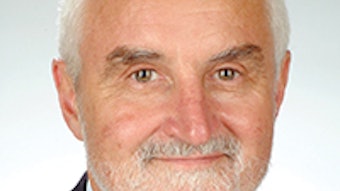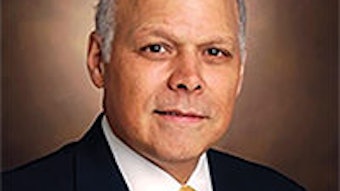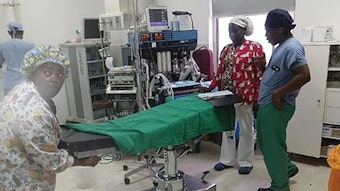Perspective: The Replacement of Medicare Carrier Advisory Committees Is a Replacement of the Physician Voice
I must admit that when Steve T. Kmucha, MD, JD, sent me this comprehensive historical review of the Carrier Advisory Committees (CAC) all the way through their demise, it brought back many good memories of my many years on the Tennessee CAC.
Steve T. Kmucha, MD, JD
Note from the Bulletin Editor
James C. Denneny III, MD
I must admit that when Steve T. Kmucha, MD, JD, sent me this comprehensive historical review of the Carrier Advisory Committees (CAC) all the way through their demise, it brought back many good memories of my many years on the Tennessee CAC. Even though I had to drive three hours each way from Knoxville to Nashville, there was no question in my mind that that committee did a lot of good things for physicians and their patients. The open discussions between practicing physicians and administrative leaders were not contentious in those days and, for the most part, the collaborative solutions benefited all involved. That appointment ended up being one of the most important I have ever received. I learned more about the inner workings of the Health Care Financing Administration (now Centers for Medicare & Medicaid Services) and other insurers from that service than any other I have experienced. I was very disappointed to learn that the CACs have been phased out.
The CACs were one of the great examples of how critical it is to have practicing physicians—not just physicians who now work in alternative roles—involved in decision-making processes regarding patient care. No matter how objective one is, the main focus is not the same for those no longer seeing patients. The biggest loss in the transition is that element being required in all areas. One of the reasons the physician community fought so hard against the Independent Payment Advisory Board as described in the Affordable Care Act was that there was no true practicing physician representation on that body. Those of you who have opportunities to participate on a panel such as this should take advantage of them, even though it does take additional time and effort. This is one of the few areas in which individuals can make tangible differences in health policy.
In 1992 the Health Care Finance Administration (HCFA), part of the U.S. Department of Health and Human Services (HHS), directed the nation’s Medicare Carrier Medical Directors (CMD) to establish Carrier Advisory Committees (CAC). CACs, which were generally geographically located in each state or region, were tasked with providing: 1) a formal mechanism for physicians to learn about and participate in the development of local medical review policies (LMRPs), 2) a means for identifying areas within the administration of the Medicare program that need improvement and for overcoming those challenges, and 3) a forum for exchanging information between physicians and carriers.
 Steve T. Kmucha, MD, JD
Steve T. Kmucha, MD, JDTo ensure that LMRPs are examined by clinical experts for each type of service being reviewed, the CMDs were required to appoint CAC representatives for Medicare’s expansive definition of physician specialties as well as dentists, chiropractors, podiatrists, optometrists, and psychologists, along with any other provider allowed to bill Medicare directly.
The Medicare carrier manual instructions establishing the CACs stated that “CAC members serve to improve the relations and communication between Medicare and the physician community.” Specifically, physicians serving in this position are tasked with 1) disseminating proposed LMRPs to colleagues in their respective states and specialty societies to solicit comments, 2) distributing information about the Medicare program obtained at CAC meetings to their respective state and specialty societies, and 3) discussing inconsistent or conflicting medical review policies within the CAC.
It is important to emphasize the role of physician attendance at CAC meetings as 1) they are required to receive a full agenda and background material at least 10 to 14 days prior to a CAC meeting to allow adequate preparation and contribution, and 2) all CAC representatives have the opportunity to review each draft LMRP and critique them. As a result, physician CAC representatives have long been identified as important resources for the Medicare Administrative Contractor (MAC) medical directors. More importantly, physician CAC representatives have the opportunity to provide feedback about draft policies and thereby have the opportunity to influence Medicare coverage.
In the past, many MAC medical directors have emphasized the importance of physician participation on the CACs. Prior to the implementation of the CACs, numerous policies were developed independently by regional MACs with inconsistent input from only a few physician consultants. CACs were touted as providing an opportunity to offer MACs a broad base of consultants, each of whom has a slightly different perspective. It was warned that those physicians who fail to participate as active and engaged representatives of their geographic or specialty society could contribute to “unenlightened coverage decisions.”
Each CAC submitted testimony to the regional MAC, and the medical director of the regional MAC submitted recommendations to a national Medicare Coverage Advisory Committee (MCAC). The MCAC would summarize the recommendations of the regional MACs and make recommendations to HCFA. HCFA could then adopt or disagree with the MCAC recommendations and issue a national medical review policy (NMRP) or leave the service to be covered at the discretion of the regional MACs based upon the established LMRP in those regions. In 2000 it was estimated that 90% of Medicare coverage decisions were covered only by LMRPs without a corresponding uniform NMRP; this supported the importance of active participation of each physician representative at the local CAC.
Fast forward to 2018, many things had changed at the HCFA and with the Medicare program. The HCFA is now called the Centers for Medicare & Medicaid Services (CMS) but remains an agency at HHS, which administers the Medicare program—the federal component of the Medicaid program—and oversees Medicare’s healthcare financing.
During 2018, HHS Secretary Alex Azar worked to achieve amendment of 42 U.S.C. 217a, section 222 of the Public Health Service Act. This amendment resulted in the creation of a revised Medicare Evidence Development & Coverage Advisory Committee (MEDCAC), which is governed by the provisions of Public Law (P.L.) 92-463 that sets forth the standards for the formation and function of Medicare advisory committees. The stated objective of this change would allow the secretary of HHS, and by delegation, the administrator of the CMS and the director of the Center for Clinical Standards and Quality within CMS, to decide what medical items and services are reasonable and necessary, or otherwise covered, for Medicare beneficiaries under title XVlll of the Social Security Act. The newly established MEDCAC would provide advice to CMS regarding the evidence on topics under review by Medicare.
The explicitly stated fundamental purpose of the creation of the MEDCAC is to support the principles of an evidence-based determination process for Medicare’s coverage policies. MEDCAC was envisioned to establish panels that would provide advice to CMS on the strength of the scientific evidence available for specific medical treatments and technologies through a “public, participatory, and accountable process.” The MEDCAC will work from an agenda provided by the Designated Federal Official (DFO) that would list specific issues for investigation and would develop technical advice in order to assist CMS in determining reasonable and necessary uses of medical services and technology. The MEDCAC may be asked to develop recommendations about the quality of the scientific evidence for specific issues of Medicare coverage or related policies, and/or to review and comment upon proposed or existing Medicare coverage policies and the evidence upon which the policies rely. CMS may also ask the MEDCAC to comment on pertinent aspects of proposals being considered and/or other policies.
CMS Administrator Seema Verma was given the authority to select a full-time or permanent part-time federal employee to serve as the DFO to attend each MEDCAC and sub-committee meeting to ensure that all procedures are within applicable statutory and regulatory directives. The DFO will approve and prepare all meeting agendas, call all of the MEDCAC and subcommittee meetings, adjourn any meeting when the DFO determines adjournment to be in the public interest, and chair meetings when directed to do so by the official to whom the committee reports (i.e., CMS administrator). The DFO or a designee shall be present at all meetings of the full committee and subcommittees.
The language of the amended Title states that the MEDCAC shall consist of a maximum of 100 members who will be appointed as special government employees or representatives. Members shall be selected by the CMS administrator, or designee, from among authorities in clinical and administrative medicine, biologic and physical sciences, public health administration, advocates for patients, healthcare data and information management and analysis, the economics of healthcare, medical ethics, and other related professions. A maximum of 90 members shall be at-large standing members (10 of whom are patient advocates) and 10 shall be members representing industry interests. The administrator or designee will appoint a chair and vice-chair from among the pool of at-large members.
Members shall be invited to serve for four-year terms. Terms of more than two years are contingent upon renewal of the charter. Members may serve after the expiration of their terms until successors have taken office. The period of service for the chair and vice chair shall be for no more than four years. The Agency may adjust terms of membership to ensure that MEDCAC member terms expiring do not exceed 25% per year. A panel roster will be developed and published in advance for each MEDCAC meeting. Members will be chosen to serve at each MEDCAC or sub-committee meeting according to their expertise and the topic to be discussed.
The panel roster for each MEDCAC or sub-committee meeting will be comprised of the standing chair (or standing vice chair) who will preside, or in their absence, an interim chair delegated by the CMS administrator or designee, one industry representative, and one patient advocate. The remaining members of the panel roster will be chosen from the standing pool of at-large members. There will be no more than 15 MEDCAC members serving at a particular meeting. A quorum is required for all meetings and shall consist of a majority of the members designated for service at each meeting. In addition to the committee members, the committee may include guests whose expertise pertains to the meeting topic. This final decision was published in the Federal Register on November 24, 2018.
Soon after this final decision was published, the regional MAC medical directors were informed that there would be little need to convene regional CACs. In some regions, a decision was made to replace the formal CAC process with the Informal Medicare Physician Advisory Council (IMPAC) process comprised of nearly the same individuals who had been previous members of the formal CAC process. IMPAC meetings have continued during the interim. This has effectively removed the regional physician members of the CACs and the MAC medical directors from the policy development process and limited the decisions and the resulting impact on physician payment to a few handpicked individuals with MEDCAC meetings, agendas, and member compositions controlled by a direct appointee of the CMS administrator—a political appointee. Of a maximum of 100 members of the MEDCAC, 10% are allocated to patient advocates and an additional 10% are allocated to industry representatives. Meetings of the MEDCAC are limited to just 15 members—members who are selected by a handpicked federal employee who is similarly handpicked by Administrator Verma, and thus potentially excluding the input of many physician groups.
The current roster of MEDCAC members was established in November 2019. A review of this roster shows significant representation from some medical specialties (e.g., cardiology, cardiac surgery, neurosurgery, etc.) and no representation from many others. It is clear that the voices of many physicians and many medical specialties have been excluded from the process. It is also clear that these changes have transferred a great deal of power and authority away from the physicians of the CAC and the MAC physician medical directors. The new charter placed this power in the hands of a very small number of individuals, many of whom are not physicians and many of whom represent industries with significant potential to gain financial benefit from the decisions made by the MEDCAC. And all of whom were never elected to their positions but only serve as appointees.
Recently, there has been a significant change in the impact of the resumption of many new pre-authorization requirements from Medicare for many of the most common procedures performed by otolaryngologists. Since physicians in general and otolaryngologists specifically have been excluded from the process and replaced with patient and industry representatives by political appointees, is anyone surprised?












